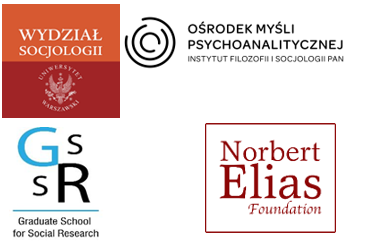International Workshop for PhD students and Postdoctoral Researchers

International Workshop
for PhD students and Postdoctoral Researchers
Violence and its sublimation within the fantasy-reality continuum: Between psychoanalysis and the theory of civilizing process.
6-8 December 2022
Venue: Graduate School for Social Research, GSSR Nowy Swiat 72, 00-330, Warsaw, Poland
Call for Participation
Applications due: 2 November 2022
As a prelude to the conference on The Fantasy-Reality Continuum, Science, Religion, Politics, Culture being held on December 8-10 at the University of Warsaw, Norbert Elias Foundation together with Faculty of Sociology (University of Warsaw), Graduate School for Social Research (Polish Academy of Sciences) and Center for Psychoanalytic Thought (Polish Academy of Sciences) organize a workshop for PhD students and postdoctoral researchers working on topics related to the question of violence and the fantasy-reality continuum. A central theme of this event are the interconnections between psychoanalysis and Norbert Elias’s theory of civilizing and decivilizing processes.
While the role of violence has been significantly reduced within the social norms characteristic of liberal societies, frequent discrepancies between norms and practices continue to be experienced, including failures of the state and the market, increases in social and economic inequality, exclusion and discrimination. Recently, the persistence of violence has been dramatically brought back into the spotlight by the crisis of the liberal order resulting in political turmoil and warfare across the world. Once pushed to the margins, violence is now to be clearly seen in the position it has always occupied – at the core of civilizational conflicts.
It is, however, not only the harsh reality of violent acts – wars, terrorism, rejection of refugees, and femicides, that challenges contemporary societies, but also a growing normative collapse characterized by an increasing willingness to succumb to the fantasies of the political, social and economic order based on naked force. Is violence more congruent with reality, more ‘natural’ than the state of non-violence? To what extent do the findings of historical sociology and psychoanalysis oppose naturalization and legitimization of violence?
In this workshop, whose instructors include Professors Robert van Krieken (University of Sydney), Marta Bucholc (Faculty of Sociology, University of Warsaw; Centre de recherche en science politique, Université Saint-Louis Bruxelles), Andrzej Leder (Institute of Philosophy and Sociology, Polish Academy of Sciences), Adam Lipszyc (Institute of Philosophy and Sociology, Polish Academy of Sciences) and Krzysztof Świrek (University of Warsaw) we will look at case studies of sublimating violence – culturally, politically and socially – proposed by the participants.
Following Freud, we understand sublimation as the shifting of forbidden impulses towards acceptable or socially valued outlets. Yet, we go beyond Freud’s discussion of sublimation in the context of redirecting libido to non-sexual activities, to examine the applicability of this concept for studies of historical transformations of violence within Norbert Elias’ theory of ‘civilising processes’.
In Elias’s theory, the monopolisation of violence by the state is understood to produce pacified social spaces, where elimination of aggression between individuals is achieved through sensitisation and standardisation of emotional and behavioural norms. The question arises whether this process constitutes sublimation rather than elimination of violence, privileging ‘symbolic violence’ over physical violence in establishing domination. Are we encountering the growth of socially acceptable violence inflicted by the ‘agents of law’ on the part of both the states and supranational bodies? Does proliferation of violence in contemporary political and cultural fantasies speak of civilising or de-civilising processes?
We welcome proposals of papers applying psychoanalytic or Eliasian approaches to case studies thematizing violence, its sublimations, and its historical transformations. The cases might exemplify some of the following forms, experiences, discourses and representations of violence:
- physical violence between individuals;
- state and war violence;
- economic violence;
- colonial violence and slavery;
- sexual violence;
- symbolic violence;
- socially acceptable violence;
- self-inflicted violence and techniques of conforming to social norms;
- sublimations and regimentation of violence in historical perspective;
- legitimisations of violence;
- historical and psychological transformations of tolerance to violence;
- trauma and social memory of violence;
- cultural representations, misrepresentations and concealing of violence;
- measures and policies counteracting violence.
The workshop’s working language is English. The events’ structure involves presentations by the instructors, and discussions of participants’ papers. Each paper will be commented by one instructor and one peer discussant, followed by general discussion. All participants will be expected to have read each other’s papers prior to the start of the workshop.
Researchers at the doctoral and postdoctoral levels interested in taking part in the workshop are invited to electronically submit a short academic CV and a research proposal (max. 300 words) outlining the topic of the paper that they intend to present and discuss, no later than 2 November 2022. There is no participation fee, but participants will need to cover their own travel and accommodation expenses. Lunch will be provided by the organisers.
Candidates will be notified of the outcome of their application by 4 November. The selection committee will include the workshop instructors and the two conveners: Emilia Sieczka, Graduate School of Social Research, Polish Academy of Sciences, and Paweł Bagiński, Doctoral School of Humanities, University of Warsaw.
Successful applicants will be asked to prepare a draft paper of 2,000 – 4,000 words for submission no later than 25 November 2022, for pre-circulation among all participants and the academic instructors.
Applications should be sent to emilia.sieczka@gssr.edu.pl, CC to p.baginski3@uw.edu.pl